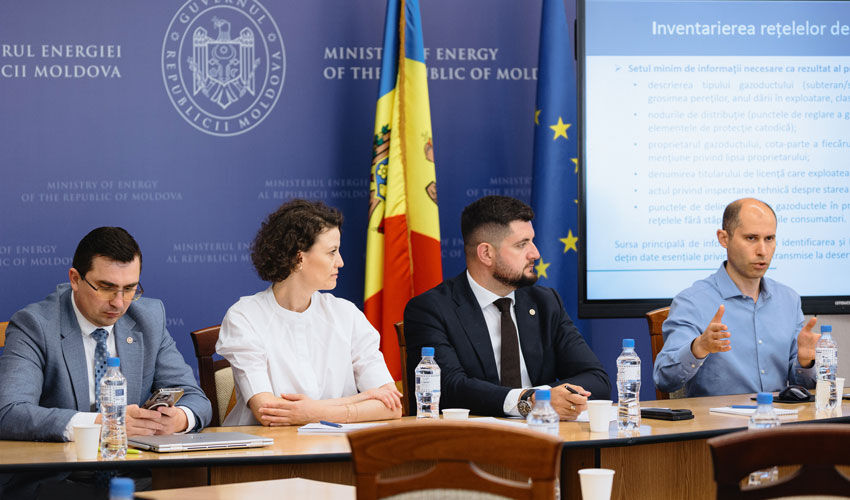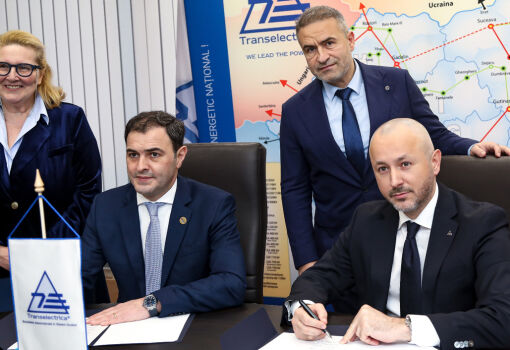
The stated objective is to test the methodology of accounting and management of gas networks owned by third parties or not owned but managed by natural gas distribution companies, which are part of Moldovagaz JSC. “The experience gained will be disseminated at the national level,” said Energy Minister Dorin Jungietu.
According to information from the Ministry of Energy, Moldova’s gas system currently looks like this. The gas transportation pipelines are managed by Vestmoldtransgaz, a subsidiary of the Romanian state operator Transgaz. The distribution of natural gas to consumers is handled by 19 licensed companies, 12 of which are part of Moldovagaz JSC.
Of the total length of 25.8 thousand kilometers of natural gas distribution networks, about 35% are owned by gas companies, more than 60% are under their technical maintenance, and about 4.4% of the networks are considered ownerless. However, they are also operated by gas companies because safety requirements must be observed.
Over the last 30 years, Moldova’s gas networks have been developed in various ways – through investments by the state, private firms, contributions from local communities and ordinary citizens. On the one hand, this has increased the population’s access to natural gas, but on the other hand, it has created numerous legal and technical problems.
This August 2025 meeting at the Ministry of Energy was the final event of the technical assistance project funded by the Soros Moldova Foundation. Dorin Jungietu informed that within this project, the Concept of management of gas networks owned by third parties or without owner, but administered by Moldovagaz JSC was developed.
It is worth mentioning that from September 1, 2025 the state enterprise Energocom will become the main supplier of natural gas instead of Moldovagaz. This decision was taken by the National Energy Regulatory Agency (ANRE) at the beginning of August. Energocom is responsible for providing services to consumers and will also send invoices to consumers. And almost simultaneously with the replacement of the main supplier, there is a statement about the inventory of networks. It is clear that such coincidences are not coincidental, independent experts believe.
Going back a few years, we should recall the stages of attempts to conduct inventory. In May 2008, the government decree No. 597 “On the inventory and revaluation of publicly owned gas networks” was issued. The document states that local public administration authorities are recommended to carry out the inventory at the expense of financial means of the state budget and local budgets. A separate paragraph states: to legalize gas networks of undetermined ownership in accordance with the established procedure.
In October 2013, Government Decision No. 828 approved the “Methodology for the assessment of natural gas networks of public ownership”. It established the methods of valuation and determination of the market value of the networks.
In 2023, technical assistance from foreign investors (including Soros Moldova Foundation) was provided, which helped the Ministry of Energy to develop a conceptual and legal framework for the management of natural gas networks, an area that is critical for energy security. At that time, there were also active discussions among specialists.
Thus, energy expert Serghei Tofilat (in 2023 – member of the Supervisory Board of Moldovagaz JSC) stated that the operator Moldovagaz does not own the entire gas distribution system in Moldova. “The length of gas distribution networks in Moldova is about 25 thousand kilometers. Of these, only about 8 thousand kilometers belong to Moldovagaz. About 15 thousand km are under technical management. These networks were built at the expense of budgetary funds, at the expense of mayor’s offices and at the expense of consumers themselves. It is necessary to deal with these networks, to understand what we have, who is the owner, what is the condition of the networks? A working group has already been set up together with the Ministry of Energy and the Public Property Agency.
Sergei Tofilat said that the confusion was greatly aggravated by the decision of the former government, which in the early 2000s allowed the construction of gas lines in the districts at their expense, although according to the regulations, the money for this should have been spent by the operator. The local mayor’s offices allocated funds, the money was collected from people, and the amounts varied from district to district, with people giving several thousand lei.
When the first gas pipelines built by local authorities appeared in 2004, the question arose: who will work through them, as the mayor’s offices do not have licenses for gas distribution. They started looking for workarounds, creating “consumer associations” under the mayor’s offices, which gave the networks to Moldovagaz for free use. Already in 2008 the situation became confusing, so they decided to make an inventory of the gas transportation system, but it never took place.
– There was no inventory and evaluation in 2008,” said Serghei Tofilat. – People gave money and got nothing back. Now we have to deal with it. We need to make an inventory, make an assessment of these assets. Clear rules are needed: who manages the networks, how the necessary investments are ensured, who is responsible for security and continuity of supply.

